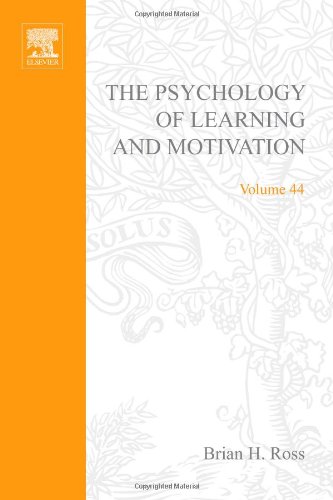

Most ebook files are in PDF format, so you can easily read them using various software such as Foxit Reader or directly on the Google Chrome browser.
Some ebook files are released by publishers in other formats such as .awz, .mobi, .epub, .fb2, etc. You may need to install specific software to read these formats on mobile/PC, such as Calibre.
Please read the tutorial at this link: https://ebookbell.com/faq
We offer FREE conversion to the popular formats you request; however, this may take some time. Therefore, right after payment, please email us, and we will try to provide the service as quickly as possible.
For some exceptional file formats or broken links (if any), please refrain from opening any disputes. Instead, email us first, and we will try to assist within a maximum of 6 hours.
EbookBell Team

5.0
88 reviews
ISBN 13: 9780125433433
Author: Brian H Ross
The Psychology of Learning and Motivation publishes empirical and theoretical contributions in cognitive and experimental psychology, ranging from classical and instrumental conditioning to complex learning and problem solving. Each chapter provides a thoughtful integration of a body of work.
Chapter 1. ECOLOGICAL VALIDITY AND THE STUDY OF CONCEPTS
I. Introduction
II. Three Disputes
III. What Is the Psychology of Concepts a Psychology of ?
IV. Capacities versus Performance Models
V. What Should We Be Trying to Explain in the Psychology of Concepts?
VI. The Missing Piece to the Puzzle
VII. What Is the Real Category Structure?
VIII. Role Models
IX. Conclusion
References
Chapter 2. SOCIAL EMBODIMENT
I. Introduction
II. Social Embodiment Effects
III. A Theory of Social Embodiment
IV. Explaining Social Embodiment Effects
V. Conclusion
References
Chapter 3. THE BODY’S CONTRIBUTION TO LANGUAGE
I. Introduction
II. Symbol Grounding and the Action–Sentence Compatibility Effect
III. How Language Becomes Embodied Meaning
IV. Perceptual Symbols in Language Comprehension
V. Grammatical Constructions in Language Comprehension
VI. Learning and the Indexical Hypothesis
VII. Conclusion
References
Chapter 4. USING SPATIAL LANGUAGE
I. Introduction
II. Constituent Processes during Apprehension
III. Assigning Directions to Space: Setting the Parameters
IV. Generalizations and Conclusions
References
Chapter 5. IN OPPOSITION TO INHIBITION
I. Introduction
II. A ‘‘Reader’s Digest ’’ History of Inhibition
III. The Attention Case Studies
IV. Memory Case Studies
V. The ‘‘Big Picture’’
References
Chapter 6. EVOLUTION OF HUMAN COGNITIVE ARCHITECTURE
I. How Information Structures Have Impelled the Evolution of Human Cognitive Architecture
II. Human Information Processing Recapitulates Evolution by Natural Selection
III. Instructional Consequences
IV. Conclusions
References
Chapter 7. COGNITIVE PLASTICITY AND AGING
I. Overview
II. Cognition across the Adult Life Span
III. Changes in Brain Function and Structure across the Adult Life Span
IV. Does Experience Reduce Age-Related Cognitive Decline?
V. Can Laboratory-Based Training Be Used to Reduce Age-Related Decline in Cognition, and If So, What
VI. Can Other Interventions Reduce Age-Related Decline in Cognition: Healthy Body, Healthy Mind?
VII. Conclusions and Future Directions
References
Tags: Brian H Ross, Psychology, Motivation